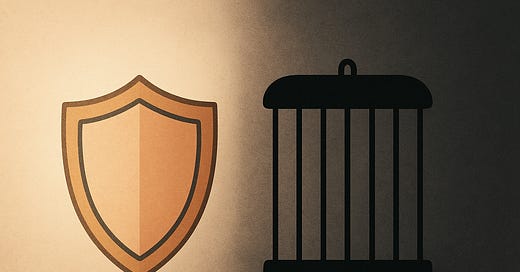"Power is of two kinds. One is obtained by the fear of punishment and the other by acts of love. Power based on love is a thousand times more effective and permanent then the one derived from fear of punishment." — Mahatma Gandhi
The Protector's Instinct (And Its Shadow)
Protection.
A word we feel deep in our bones.
An instinct. To shield. To guard.
To keep safe those we love.
It feels right. Necessary, even.
But wait. Pause. Look closer.
There’s a shadow that walks beside protection.
Its name is Control.
And the line between them?
It blurs. So easily. Fades like chalk in the rain.
When does the shield we offer become a cage we build?
When Protection Becomes Possession
Think of the quiet moments.
After the argument.
The tension still hanging heavy in the air.
Maybe you told yourself: I was protecting them.
My family. My partner. My child. My responsibility.
But were you? Truly?
Or was control wearing protection’s mask?
Was it fear, not love, guiding your words, your actions?
We see it happen.
The parent, driven by fear of a harsh world, clips their child’s wings.
Calls it safety.
Forbids risk.
Mistakes restriction for care.
The partner whose deep devotion becomes a tightening grip.
Possessiveness disguised as love.
The leader whose rules promise security, but deliver only rigidity.
Stifling growth. Demanding compliance.
Or even the friend who 'looks out' for another by constantly overriding their choices.
The intention might feel pure. Protective. Right.
But protection born of fear doesn’t empower.
It diminishes.
It doesn’t build trust.
It breeds quiet resentment.
It doesn’t foster resilience.
It creates dependence.
A gilded cage is still a cage.
True connection, however, flourishes only in freedom.
Control whispers safety—a short-term lie.
For the price is connection, fractured.
Resilience, unlearned.
And the human need for freedom? Thwarted.
Science confirms the cost: well-being withers under control's shadow.
The Guardian's Way: Empowerment Over Ownership
There is another way.
A different kind of strength.
The Guardian’s way.
This isn't passivity. It's intentional action—
choosing empowerment over ownership.
It’s not about holding tighter.
Not about owning.
Not about controlling outcomes.
It’s about knowing when to stand firm,
and when to step aside.
When to offer shelter,
and when to trust others to navigate the storm.
Imagine that parent again.
Same love. Same desire for safety.
But a different path.
Instead of forbidding, they equip.
Teach awareness. Build skills. Foster resilience.
They prepare their child for the world, trusting them to learn, to stumble, perhaps, but ultimately, to rise.
They offer a shield when needed, not a cage to prevent the journey.
They tend the garden, nurturing growth, not prune every branch that reaches for the sun.
Research echoes ancient wisdom.
Decades confirm it.
Children thrive not in the grip of control,
but in the open hand of guidance,
their autonomy respected, their spirit free to grow.
One controls. The other empowers.
One restricts life. The other enables it.
The difference? It is everything.
Strength Redefined: Restraint, Trust, Presence
So, what is strength? Really?
If not dominance? If not control?
Strength is found in restraint.
Knowing power isn't always meant to be used.
Sometimes the strongest move is the pause—
giving space for better solutions to emerge.
The deep breath. The choice to listen—truly listen—before acting.
Strength is trust.
Deep trust.
Trusting others to find their own footing.
Trusting ourselves to guide, not dictate.
To protect without policing.
This builds partnerships stronger than any hierarchy.
And the studies agree:
Teams built on trust?
Partnerships grounded in safety?
They don't just survive. They thrive.
Outperforming fear, every time.
Strength is presence—
that core practice of showing up fully, engaged with this moment,
grounded in love, not fear.
Reflection: Guardian or Controller?
These aren't easy questions,
and the answers might shift day to day.
But starting to ask them is powerful:
This requires honesty. A willingness to look inward.
Ask yourself:
Who do I seek to protect? Why?
What truly drives that instinct?
Does my care empower their growth? Their freedom?
Or does it confine them? Limit their potential?
Do I lead with trust? Offer autonomy?
Or do I operate from fear? Demand obedience?
Is it love guiding my hand? Open, generous love?
Or is it my own insecurity? My own need for control?
Be still.
Listen.
What answer surfaces from the quiet?
Are you guarding? Truly guarding?
Or are you controlling?
And what does that choice build between you?
The Path Forward: Connection, Trust, Empowerment
The path forward isn't control.
No. It is connection. It is trust. It is empowerment.
It’s the daily choice, the moment-by-moment decision,
to offer a shield, never a cage.
To stand firm against harm, without standing in the way of growth.
How will you show up today?




I think this is one of the biggest distinctions that men need to process; our bodies privilege us to be stronger on average than our distaff counterparts. So many men get caught up on the protector role that they forget what protection even is. You are not their prison Warden, you are their rock. You enable your partner, your child, your friend to come out of their shell and not fear they will be hurt for pursuing their dreams and using their gifts. Strong nations have many different kinds of people, protected by laws and guardians who ensure the law is carried out. Weak countries have little variety, and are unable to use large swaths of their populations' talents because those people are oppressed by "strong" men or otherwise disincentivised from even trying. They then wither and die, because no guardians came out and protected those who were physically weaker.
Are we ever going to address how women (mothers) control instead of protect? My dad did his best to be a protector; my mother was more concerned with control. I don't think it's necessarily men who need to learn this.